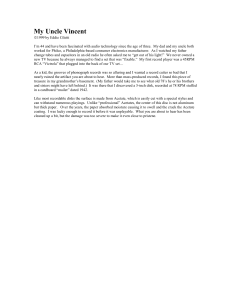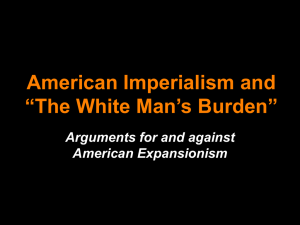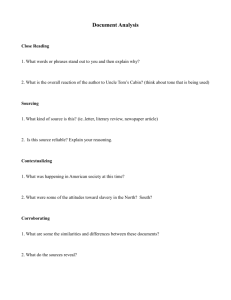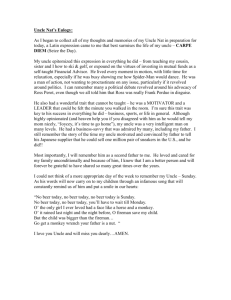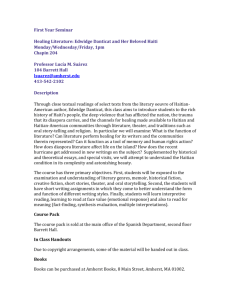Not Your Homeland
advertisement
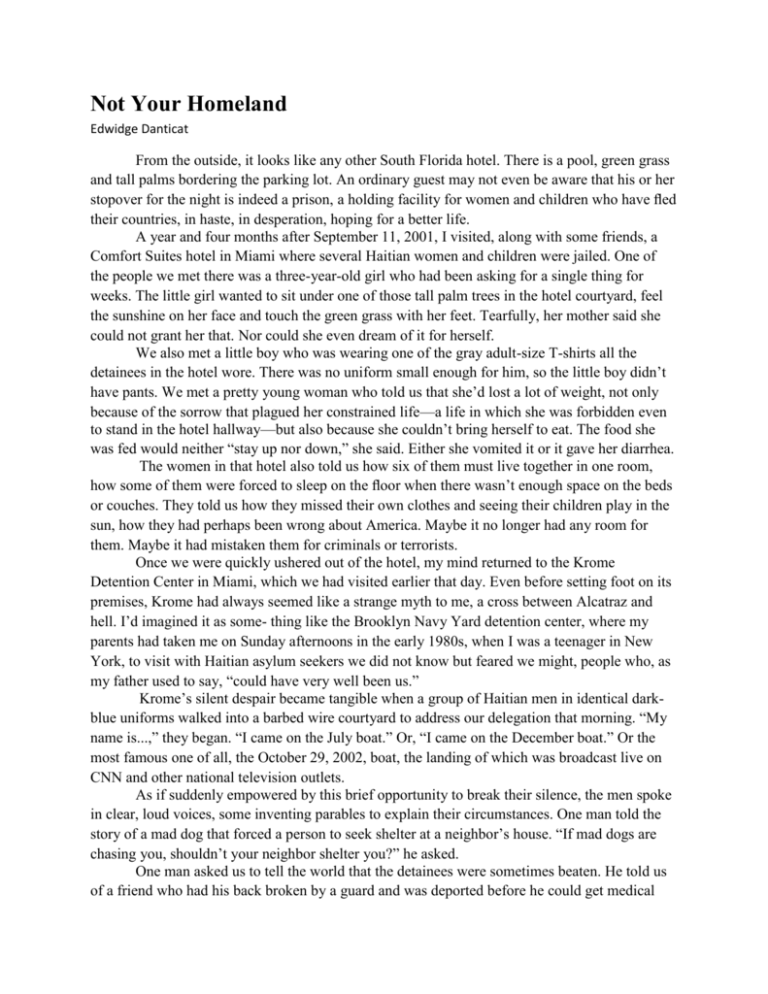
Not Your Homeland Edwidge Danticat From the outside, it looks like any other South Florida hotel. There is a pool, green grass and tall palms bordering the parking lot. An ordinary guest may not even be aware that his or her stopover for the night is indeed a prison, a holding facility for women and children who have fled their countries, in haste, in desperation, hoping for a better life. A year and four months after September 11, 2001, I visited, along with some friends, a Comfort Suites hotel in Miami where several Haitian women and children were jailed. One of the people we met there was a three-year-old girl who had been asking for a single thing for weeks. The little girl wanted to sit under one of those tall palm trees in the hotel courtyard, feel the sunshine on her face and touch the green grass with her feet. Tearfully, her mother said she could not grant her that. Nor could she even dream of it for herself. We also met a little boy who was wearing one of the gray adult-size T-shirts all the detainees in the hotel wore. There was no uniform small enough for him, so the little boy didn’t have pants. We met a pretty young woman who told us that she’d lost a lot of weight, not only because of the sorrow that plagued her constrained life—a life in which she was forbidden even to stand in the hotel hallway—but also because she couldn’t bring herself to eat. The food she was fed would neither “stay up nor down,” she said. Either she vomited it or it gave her diarrhea. The women in that hotel also told us how six of them must live together in one room, how some of them were forced to sleep on the floor when there wasn’t enough space on the beds or couches. They told us how they missed their own clothes and seeing their children play in the sun, how they had perhaps been wrong about America. Maybe it no longer had any room for them. Maybe it had mistaken them for criminals or terrorists. Once we were quickly ushered out of the hotel, my mind returned to the Krome Detention Center in Miami, which we had visited earlier that day. Even before setting foot on its premises, Krome had always seemed like a strange myth to me, a cross between Alcatraz and hell. I’d imagined it as some- thing like the Brooklyn Navy Yard detention center, where my parents had taken me on Sunday afternoons in the early 1980s, when I was a teenager in New York, to visit with Haitian asylum seekers we did not know but feared we might, people who, as my father used to say, “could have very well been us.” Krome’s silent despair became tangible when a group of Haitian men in identical darkblue uniforms walked into a barbed wire courtyard to address our delegation that morning. “My name is...,” they began. “I came on the July boat.” Or, “I came on the December boat.” Or the most famous one of all, the October 29, 2002, boat, the landing of which was broadcast live on CNN and other national television outlets. As if suddenly empowered by this brief opportunity to break their silence, the men spoke in clear, loud voices, some inventing parables to explain their circumstances. One man told the story of a mad dog that forced a person to seek shelter at a neighbor’s house. “If mad dogs are chasing you, shouldn’t your neighbor shelter you?” he asked. One man asked us to tell the world that the detainees were sometimes beaten. He told us of a friend who had his back broken by a guard and was deported before he could get medical attention. They said that the rooms they slept in were so cold that they shivered all night long. They spoke of arbitrary curfews, how they were woken up at 6 AM and forced to go back to those cold rooms by 6 PM. One man said, “If I had a bullet, I’d have shot myself already. I’m not a criminal. I’m not used to prison.” I met an older man who came from Bel Air, the same area in Port-au- Prince where I spent the first twelve years of my life. His eyes were red. He couldn’t stop crying. His mother had died the week before, he said, and he was heartbroken that he couldn’t attend her funeral. Two months after that visit, then Attorney General John Ashcroft vetoed an immigration judge’s decision to release an eighteen-year-old Haitian boy named David Joseph, whom we’d met at Krome that day. Ashcroft argued that Joseph had to remain in custody because he posed a threat to national security. He further stated that Haiti harbors Pakistani and Palestinian terrorists, but the government could offer no proof for this charge in response to a Freedom of Information Act request from the Florida Immigration Advocacy Center. The truth was that, like many of the other refugees we had seen that day, David Joseph had fled his home not because he wanted to harm the United States but because it was impossible for him to live in his own country. Scorned by their neighbors for their parents’ political views, he and his brother had been stoned and burned, their father severely beaten. Had he not fled, he would have been killed. In November 2004 David Joseph was deported after two years in detention, even though the area in Haiti where he was from had recently been devastated by a season of tropical storms that resulted in three thousand deaths and left a quarter-million people homeless. He also had no family to return to, since no one knew, least of all him, whether any of his relatives were alive or dead. In the fall of 2004 I too suffered a devastating loss in a way I had never expected or imagined. On Sunday, October 24, 2004, United Nations troops and Haitian police forces launched an antigang operation in Bel Air, where my eighty-one-year- old uncle, Joseph Danticat, had been living for fifty years. During the operation the UN “peacekeepers,” accompanied by the Haitian police, used the roof of my uncle’s three-story house, school and church compound to fire at the gangs. When the forces left Bel Air the gang members came to my uncle’s home, told him that fifteen of their friends had been killed and said he had to pay for the burials or die. Knowing he’d never be able to produce the kind of money they were seeking, my uncle asked for a few minutes to make a phone call, grabbed some important papers and fled to a nearby house. My uncle hid under a neighbor’s bed for three days as the gang members searched for him. When they were not able to find him, they ransacked his home and church and set his office on fire. A few days later a family member helped him escape the neighborhood, and on October 29, 2004, he took a plane to Miami, just as he had done many times for more than thirty years. He had a valid multiple-entry visa. But when immigration officials at Miami International Airport asked how long he would be staying in the United States, he explained that he would be killed if he returned to Haiti and that he wanted “temporary” asylum. He was immediately arrested and taken to Krome, where medicine he had brought with him from Haiti for an inflamed prostate and high blood pressure was taken away from him. On November 3, 2004, while still in the custody of the Krome Detention Center, and thus the Department of Homeland Security, he died at a nearby hospital. As my uncle lay dying in a hospital bed in a ward reserved for hardened criminals, my repeated requests to visit him were denied by Department of Homeland Security and Krome officials for what I was told were “security rea- sons.” In other words, my uncle was treated like a criminal when his only offense was thinking that he could find shelter in the United States. Before this tragedy struck our family, I had not quite heeded my father’s warning and never truly believed that the asylum seekers we visited so often could really include one so close to us. However, nothing proves more than what happened to my uncle, an elderly man of the cloth, that we all live with a certain level of risk in post–9/11 America. Still, those of us who are refugees and exiles must live with the double menace of being both possible victims and suspects, sometimes with fatal consequences. Will America ever learn again how to protect itself without sacrificing a great many innocent lives? So that my uncle did not die in vain, I truly hope so.
